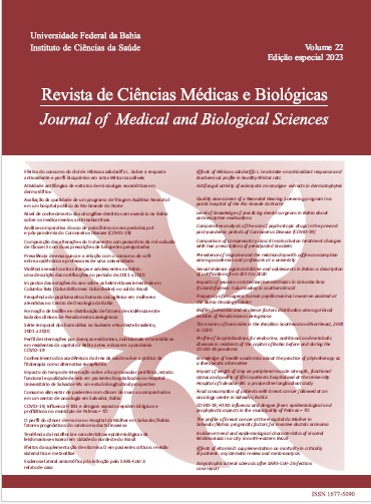Hospitalization repercussions on peripheral muscle strength, functional status and quality of life in patients hospitalized at the University Hospital of Salvador-BA: A prospective longitudinal study
um estudo longitudinal prospectivo
DOI:
https://doi.org/10.9771/cmbio.v22i4.53679Keywords:
Muscle Strength, Functional Status, Quality of life, Hospitalization, Patients' RoomsAbstract
Introduction: The prolonged time that the patient spends immobilized has the potential to generate several physiological repercussions. Generalized muscle weakness directly interferes with the quality of life (QoL) of these patients, and these limitations may remain for up to five years after discharge. Objective: To verify the repercussions of hospitalization on peripheral muscle strength, functional status and quality of life in patients hospitalized at the University Hospital of Salvador-BA. Methods: Prospective, observational, longitudinal, non-inferiority analytical study carried out at the medical clinic of the University Hospital Professor Edgar Santos. Data collection was carried out between September 2021 and May 2022. Patients admitted to the physiotherapy service, ≥18 years old, of both genders, were included. The instruments and outcomes were: Medical Research Council sum-score (MRC-SS) - peripheral muscle strength, Escala de Estado Functional em UTI - Functional Status Score for the Intensive Care Unit (FSS-ICU) - functional status and World Health Organization Quality of Life – Brief Form (WHOQOL-Bref) - quality of life, with two assessments. Results: 33 patients were analyzed. They had a median of 42 (27-54.5) years, female gender (60.6%), with hospitalization time ≥13 days (73%), cardiorespiratory or gastrointestinal system deficiency (24.2%), diabetes mellitus type 2 or systemic lupus erythematosus (12.1%), hospitalized for clinical reasons (97%). No significant difference was found for the scores of MRC-SS (57 (48 -60) - 57 (48.5-60); p>0.05) and FSS-ICU (33 (29-35) - 34 (32 .5-35); p>0.05). A significant difference was observed in the overall quality of life and general perception of health (14 (10-16) - 16 (14-18); p < 0.05), and physical domain (12.5 (9.7-14, 8) - 14.2 (12.1-16); p < 0.05). Conclusion: During hospitalization, there was no significant difference in peripheral muscle strength and functional status of patients, however, a significant increase was observed, at hospital discharge, in global quality of life and general perception of health and in the physical domain.
Downloads
Downloads
Published
How to Cite
Issue
Section
License
Copyright (c) 2024 Journal of Medical and Biological Sciences

This work is licensed under a Creative Commons Attribution 4.0 International License.
The Journal of Medical and Biological Sciences reserves all copyrights of published works, including translations, allowing, however, their subsequent reproduction as transcription, with proper citation of source, through the Creative Commons license. The periodical has free and free access.


